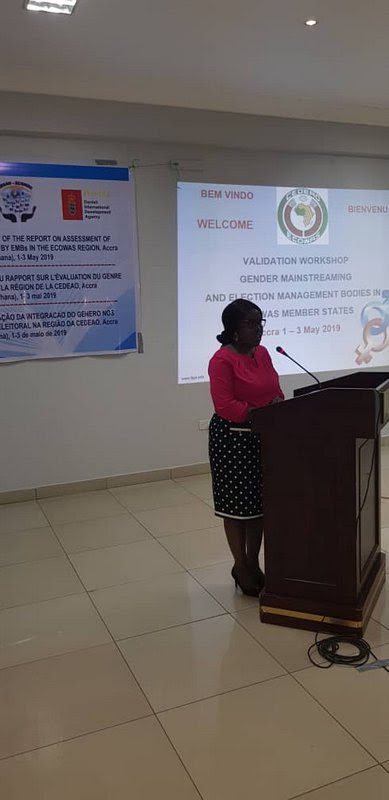The Commission of the Economic Community of West African States (ECOWAS) has called on Election Management Bodies (EMBs) in West Africa to take concrete measures to enhance women’s political participation and electoral processes more inclusive in the region.
Speaking at the opening of a workshop in Accra, Ghana on Wednesday to Validate Report on the Assessment of Gender Mainstreaming and EMBs in the ECOWAS region, the ECOWAS Commissioner for Social Affairs and Gender, Siga Fatima Njagne, noted that election management bodies play important role in the consolidation of democracy and promotion of human rights in our countries.
“They are therefore, the bodies through which women’s rights can be effectively promoted,” she said.
In her address delivered by Sintiki Ugbe, ECOWAS director of Social and Humanitarian Affairs, the commissioner said that the realisation of this goal also, “requires that different kinds of support be given to, EMBs, so that the electoral process may be inclusive”.
The ECOWAS Gender and Elections Strategic Framework and Action Plan validated by regional experts, was endorsed by the Ministers in charge of women affairs in February 2017 and the ECOWAS Council of Ministers in June the same year. This was the product of sustained commitment and collaboration between the Departments of Social Affairs and Gender, and Political Affairs, Peace and Security, specifically, the Electoral Assistance Division, “to ensure that women participate fully in electoral processes and to ensure that elections are credible, peaceful, and that the outcomes are fair to men, women, youths and other vulnerable groups,” the Commissioner added.
The 10 thematic areas of the Framework or its strategic pillars have been designed into a 5-year Action Plan (2017-2022), outlining some specific actions, including a mapping study on the Assessment of Gender Mainstreaming and EMBs in Electoral Processes in West Africa, which Report is being validated by the EMB Gender Focal Points.
While women constitute more than 50 percent of the populations of most of the 15 ECOWAS member States, one of the highlights of the study’s report is that women’s representation in various parliaments in the countries is less than 15 percent on average. This is below sub-Saharan African and World’s averages of 23.7 percent and 24.3 percent, respectively.
A statement by the ECOWAS Commission on Wednesday said that the gender mainstreaming study was carried out by the ECOWAS Gender Directorate in collaboration with the Electoral Assistance Division and the ECOWAS Network of Electoral Commission (ECONEC) with financial support by the Danish International Development Agency (DANIDA).
It added that the 50-page report highlights major impediments to gender mainstreaming in politics in West Africa, including women’s low literacy level, as well as financial and socio-cultural barriers.
It also recommends key actions to scale up the participation and representation of women and other vulnerable groups to ensure inclusiveness in the electoral process, such as adequate representation of women at EMBs and political parties, and proper funding of Gender Units at EMBs.
“The validated/final report will form the basis of an Action Plan for the enhancement of gender mainstreaming within EMBs in the ECOWAS region,” the statement added.
GIK/APA


